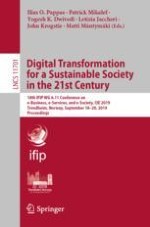2019 | OriginalPaper | Buchkapitel
Design Thinking for Pre-empting Digital Disruption
verfasst von : Aurona Gerber, Machdel Matthee
Erschienen in: Digital Transformation for a Sustainable Society in the 21st Century
Aktivieren Sie unsere intelligente Suche, um passende Fachinhalte oder Patente zu finden.
Wählen Sie Textabschnitte aus um mit Künstlicher Intelligenz passenden Patente zu finden. powered by
Markieren Sie Textabschnitte, um KI-gestützt weitere passende Inhalte zu finden. powered by
